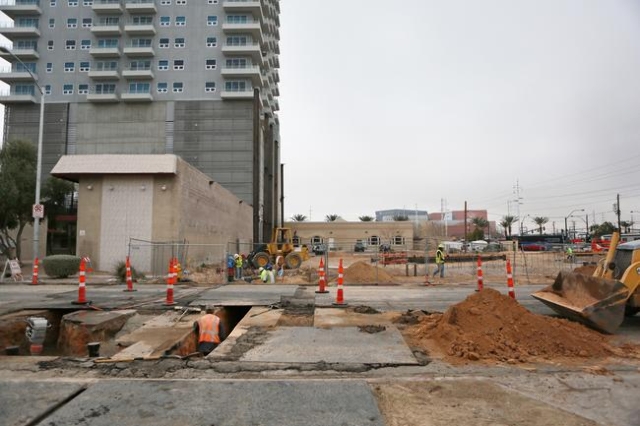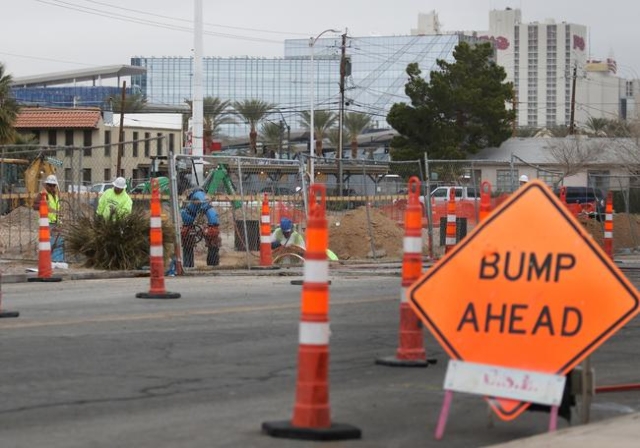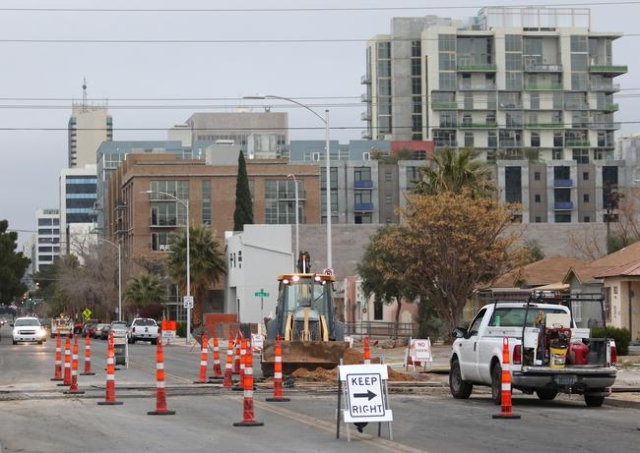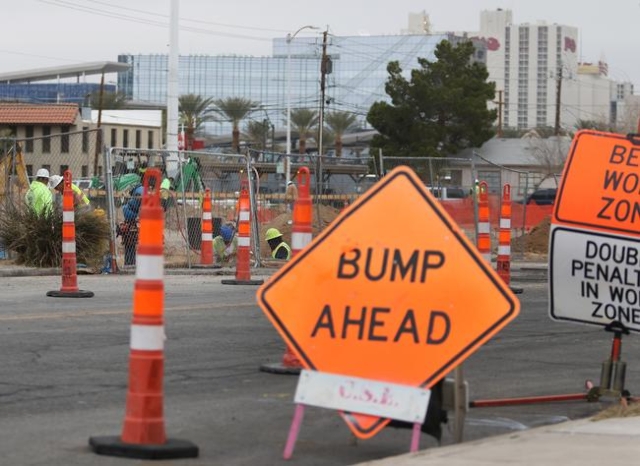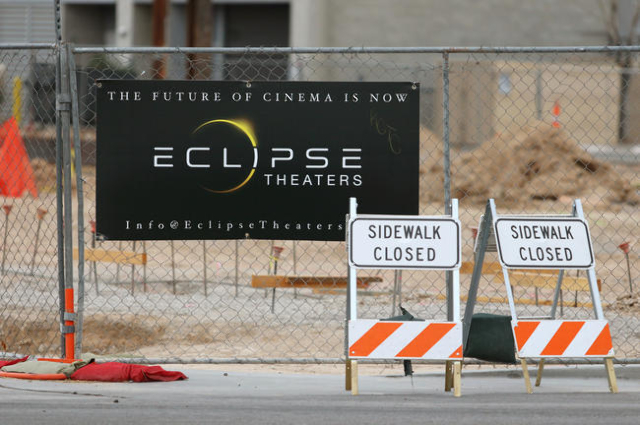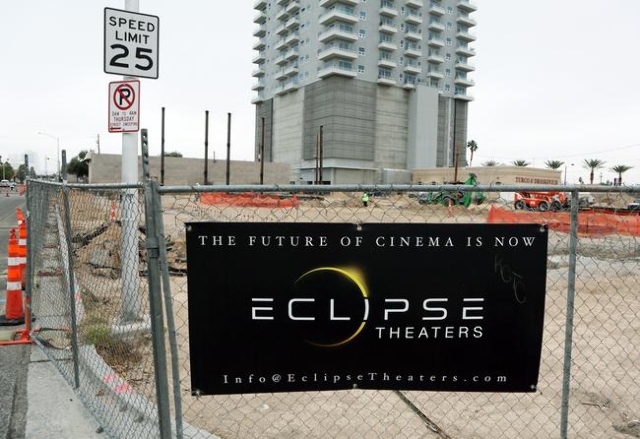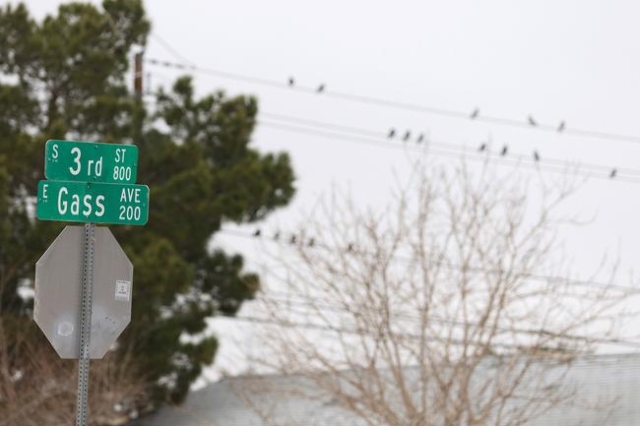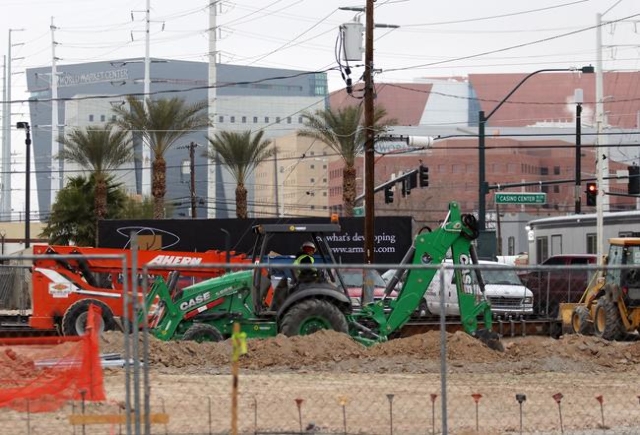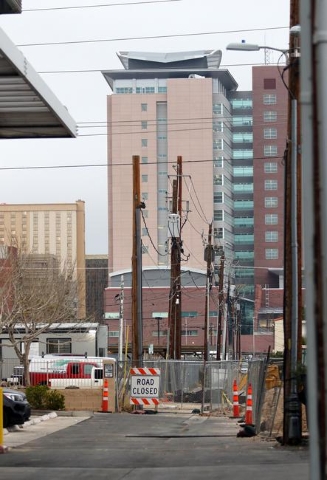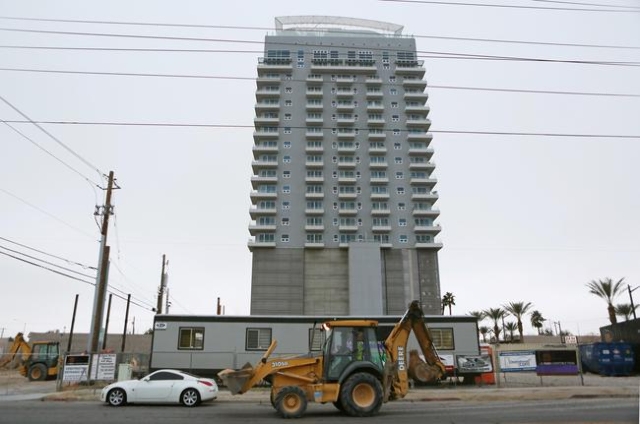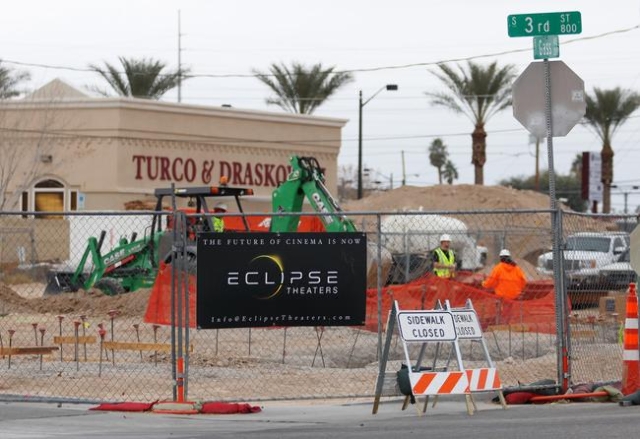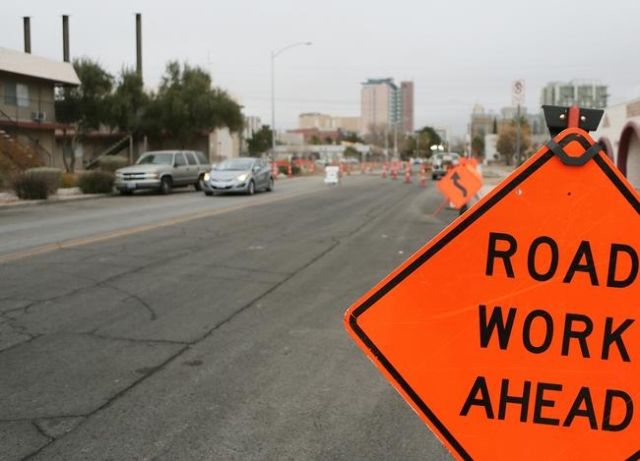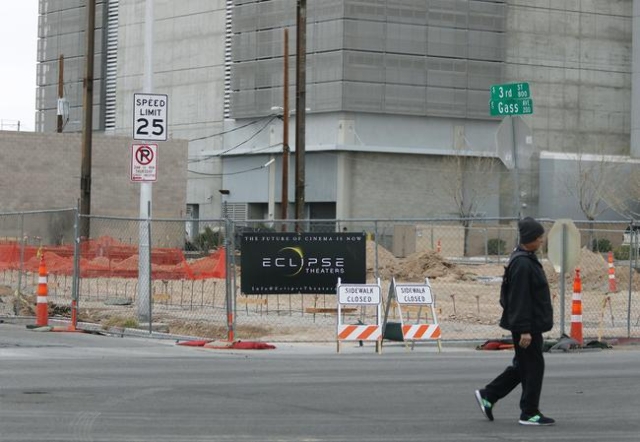Parking in downtown Las Vegas fails to keep pace with development growth
For years, the only things that seemed to grow as fast as downtown Las Vegas were concerns about where to park in downtown Las Vegas.
Public records and interviews with city staff point to the reason: Since 2000, the city has simply waived or ignored its own parking requirements when it came time to approve hundreds of projects headed for downtown.
Take the Eclipse Theaters — a much-anticipated three-story, 72,000-square-foot luxury cinema under construction in the Arts District.
That project, which was unanimously approved by planning commissioners in January 2014, will feature less than one-fourth of the parking spaces normally required for a building of Eclipse's size.
Or "Big Daddy" Carlos Adley's recently OK'd blueprints for a 20-story, roughly 300-unit mixed-use, residential and hotel tower at 601 Fremont St.
That development will include 171 of the 741 parking spaces Adley would have to build if his project were anywhere else within city limits.
Such figures aren't necessarily remarkable.
A review of Planning Commission records tied to a dozen high-profile downtown developments — from the Container Park to the Oasis at Gold Spike — show downtown developers are, on average, only required to build around 21 percent of the parking spaces planners say they need.
Some big-name builders, such as the Downtown Project, have won approval for multiple, sprawling blueprints that don't add a single parking spot to the city's downtown core.
All at a time when city officials say Las Vegans remain "deeply dissatisfied" with the lack of available parking.
But don't expect the city to start enforcing stricter parking lot requirements anytime soon. Staffers and developers said there are good reasons to let downtown builders skirt existing parking rules, including the increased availability of mass transit and the relative walkability of the city's urban core.
Some areas might not have enough parking today, they said, but that doesn't mean they won't tomorrow.
The question is who, if anyone, will build them? And who will get to use them?
For now, Las Vegas plans to leave those answers to developers.
Professor weighs in
A once-lauded abundance of free downtown parking — much of it provided by casino owners — seems to have steadily shrunk in the years since a handful of real estate developers and tech magnates started pouring cash into downtown's oft-touted redevelopment.
Much ink has already been spilled in an effort to explain the phenomenon.
Some downtown mavens see the decline as a stubborn, necessary consequence of continued downtown growth. Others say it's a simple domino effect linked to casino owners' interest in keeping parking spaces open for paying guests.
Both explanations may be correct, but Donald Shoup, a recently retired UCLA urban planning studies professor, suspects the paucity of parking has more to do with developers' bottom line.
Shoup said parking requirements drive up costs for developers, so much so that it can make it difficult for them to build.
His research concluded it would cost developers $22,000 to build an above-ground parking space, and $35,000 to build an underground space, based on construction costs in 2012.
Shoup, who opposes the use of parking requirements, said it's "best to let the developer take the risk" when it comes time to determine the right amount of parking for a downtown project.
"They're the ones best informed about the project," he said. "Minimum parking requirements make it difficult for anything they want to do."
Parking staff not consulted
The Eclipse Theaters was welcomed to downtown Las Vegas with open arms.
By the time workers broke ground on the roughly $21 million project in September, it had already received glowing write-ups in three separate Las Vegas-area publications and won rapturous reviews from downtown residents looking forward to finally catching a flick in their own backyard.
Most still are, including Tyson Wrensch, who lives next door to the project at a 23-story residential tower called Newport Lofts.
Wrensch's only worry is the same he and his neighbors have had about every recently proposed project in the Arts District: parking.
"There's a lot of empty lots, rundown homes," Wrensch said of the blocks surrounding the theater. "We have a really nice greenfield opportunity to do (parking) right. I hope the city does."
A city map shows 875 private parking spaces within a one-block radius of the Eclipse. About 250 are inside Newport Lofts garage, and the rest are privately held spots near boarded-up houses, empty lots or property owned by bail bond companies, wedding chapels and prominent downtown attorneys. On-street parking is available in the surrounding nine-block area, but with meters and various time restrictions.
Apart from a 48-space parking garage planned on the theater site — and a city-maintained lot a little more than one block away — it seems there aren't many places future theater-goers can leave their car without fear of violating a tow notice.
The developer is looking at leasing surface lots to increase parking capacity, but said some of the foot traffic would come from three nearby residential high-rises within walking distance.
City staffers' report on the Eclipse notes that the theater could use 216 parking spaces, but rules adopted under the city's Downtown Centennial Plan prevented them from forcing developers to meet that standard.
Las Vegas Parking Services Manager Brandy Stanley said unless there is a reason to deny a downtown building permit, her staff usually isn't consulted by planners when it comes time to make such parking space recommendations.
Stanley admitted some parts of downtown don't have enough parking, but said there's not a lot the city can do about it, at least by itself.
Besides a controversial, publicly subsidized parking garage in Symphony Park, Stanley couldn't name another planned city-owned downtown parking project.
"There's a lot of discussion with several (landowners) on how we can add parking inventory," she said. "We just don't own a lot of land downtown. That makes it difficult."
Slippery slope
In some areas, Stanley said, patrons and residents are just going to have to have to get used to hoofing it. In others, she sounded confident developers would provide the parking needed to maintain their businesses.
A Review-Journal analysis of Las Vegas Planning Commission documents didn't find much evidence to back that up.
Instead, the newspaper found that City Council-appointed commissioners granted variances or waived the addition of at least 147 downtown parking spaces dating back to January 2014.
That's in addition to the dozens of downtown projects approved in recent years that were simply not subject to standard parking provisions.
Blueprints for Pawn Plaza, The Market, the Container Park and a retail and office center at the Fergusons Motel were each approved without the planned addition of a single parking space, though developers behind each of those projects could at least point to ample available parking in nearby lots or parking garages.
The trouble is, those projects are far from the only ones relying on someone else's parking.
Planning documents submitted for each of the 10 largest projects approved on Fremont Street over the past decade show many developers submitted plans that didn't specifically cite viable off-site parking locations, but instead directed staffers to "other" parking lots and "nearby" garages.
Those who did disclose their parking plans cited the same five parking lots and garages — with room for around 1,200 vehicles — to support blueprints the city figures will require more than twice that amount of parking.
Stretched under the weight of visitors headed to each of its landmarks, it's easy to imagine one of downtown's shared parking lots will eventually snap — spilling hundreds of daily visitors onto the garage next door or the house down the street.
If you listen close enough, some say you can already hear them coming.
"I think it's a slippery slope," Wrensch said. "This is a driving town. There's no getting around that."
— Review-Journal Database Editor Adelaide Chen contributed to this report.



